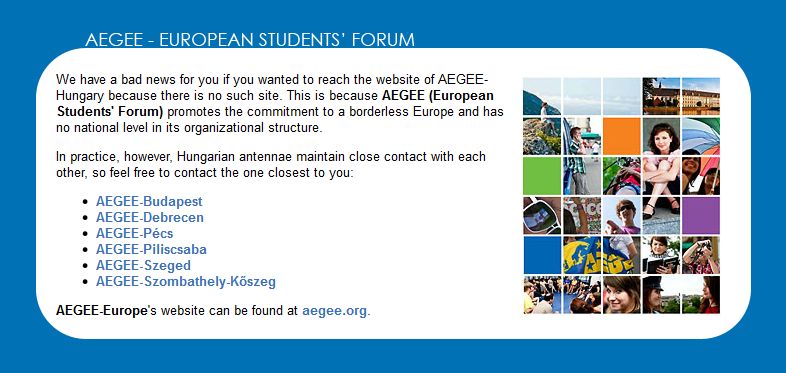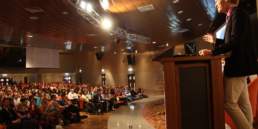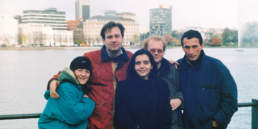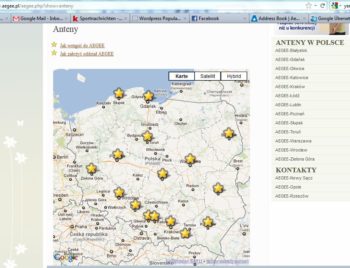
It’s the main principle of AEGEE – the European Students’ Forum knows only a local and a European level. There is no national level – or is there? In fact, there is no elected national representation of AEGEE boards of one country. There are however informal national meetings or common Internet platforms. It’s a thin line and for some people it’s crossed. The Golden Oldie had a look at some examples.
National board meetings – the Dutch example
The classic example are the Nedertop meetings. Every few months, representatives of nearly all Dutch AEGEE antennae meet in order to discuss a variety of issues, which serve the purpose of a national coordination in PR or fund-raising matters, for example. Even CD members of AEGEE-Europe attend them now and then in order to meet this influential group. These meeting exists already for decades. On the official website of AEGEE-Groningen it is explained like this (translated with Google Translate):
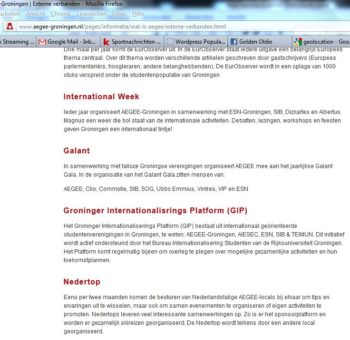
Nedertop: Once every two months, the boards of Dutch-speaking AEGEE-locals come together to share experiences and tips, but also to co-organize events and promote their own activities. Nedertops provides a lot of interesting collaborations. There is a sponsoring platform and there are collectively organised ski trips. The Nedertop is always organised by another local each time.
You can also google the words “AEGEE`” and “Nedertop” and find a lot of links. Dutch-speaking locals include also Flamish ones in Belgium. In practice it is a national coordination meeting. However, since Dutch AEGEE locals belong to the most open-minded in Europe, no one should assume that behind the Nedertop would be any kind of nationalist thinking. These meetings exist already for decades and just support the work of the antennae. It’s just pure pragmatism. Also in other countries there have been meeting of national boards in the past. However, these were isolated cases, no strategy. The same counts for national training events.
National cooperation – the Polish example
According to some participants of the Network Meeting in Gdansk in November 2011, a stronger national cooperation was a disputed topics of the 150 participants, of which nearly 140 came from Poland. Improving the national website aegee.pl, building a database of Polish trainers, a unification of the LTC programmes for all Polish antennae, a fund-raising working group that takes care of the quality of applications for funding of projects as well as cooperation with local authorities, a joint bid for strategic partner sponsorship – these were some issues that were discussed in workshops and breaks. This is however no reason to get worried, stresses Marek Pezda, freshly elected Network Commissioner. He sees no danger of creating a national level. “Indeed, we want to improve AEGEE.pl, because it already exists, but doesn’t look good. We want to update it.” He wants actually to tone down the national aspect of this site: “We want to make a website similar to AEGEE.de. It will be for promotion of AEGEE in general, not only for Polish locals. We also want to make a newsletter, but also non-Polish events will be mentioned, of course. I respect the rules of AEGEE and you can be sure I am total against creating a national level. It will never happen!”
National AEGEE websites
There are fully functioning national websites in AEGEE already: in Hungary, Italy, Netherlands, Poland and Romania. In Germany, there are very concrete plans to make the German site AEGEE.de active, the same is valid for Greece. And in Ukraine the website AEGEE.com.ua is in the process of being registered soon. Let’s take a closer look.
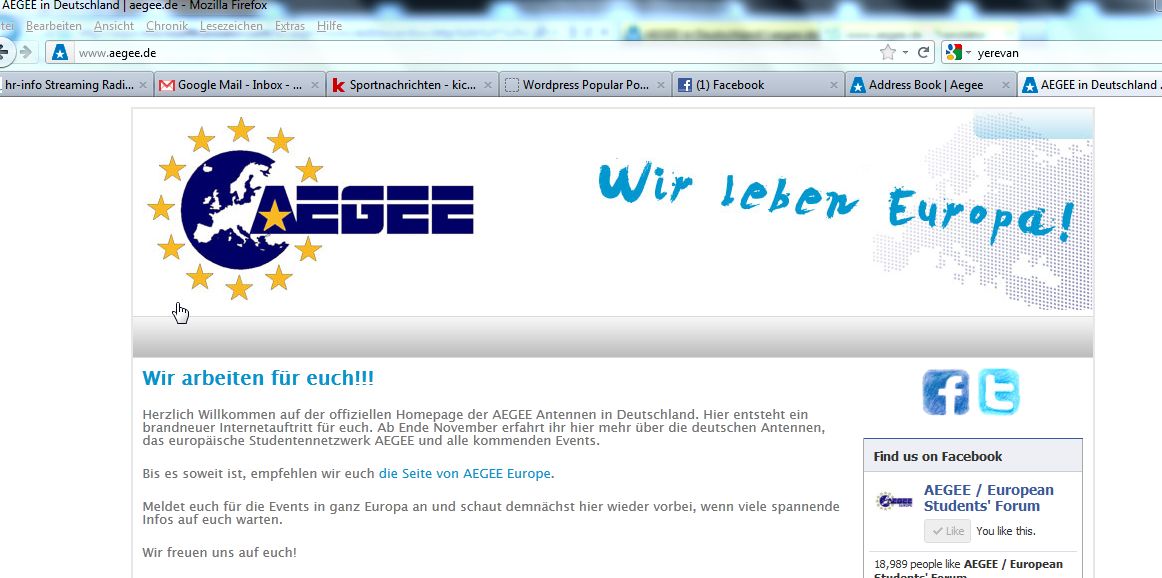
AEGEE.de: AEGEE.de was always a website to be proud of. It was written there: “In case you are looking for a website of AEGEE-Germany, there is none. AEGEE does not have a national level.” However, this website has changed a few weeks ago. Currently it is written there in German something like this (see also the picture):
We work for you!
Welcome to the official website of AEGEE antennas in Germany. Here is a brand new website created for you. As of November, you learn more about the German antennas, the European student network AEGEE and upcoming events. Until then, we recommend you the side of AEGEE-Europe. Sign up for the events in Europe and looks back over here soon, if you wait a lot of exciting information.
We look forward to seeing you!
On first sight, this is a step backwards, a step into an official national representation – at least on the web. However, this is not the intention at all. This site has a purely pragmatic goal. “One of my targets is to interlink the German locals and to simplify their PR work. Therefore we are in the process of creating a website for all German-speaking locals”, says Rebekka, the new Network Commissioner on the German-language mailing list Deutsch-L. “Our aim is of course not to create a national level. “We will stress that AEGEE does not have a national level. Next to some general information about AEGEE there will be links to all websites of the German-speaking locals. We will also create a calendar, in which we will mention all events that we organise.”
This means, different from what is written on the website itself, the intention is not to have a website for German antennae, but for German-speaking antennae. In practice, the difference is only AEGEE-Wien, but in spirit it makes a lot of difference, because regions are fine, nations are not. So let’s hope that the corrections will be made soon.
AEGEE.gr: There has not been a website of AEGEE-Greece in the past. However, this might also change. Have a look at www.AEGEE.gr. It’s written there: aegee.gr Coming Soon!
AEGEE.hu: There is also a Hungarian AEGEE website, www.AEGEE.hu. There you find the following text:
We have a bad news for you if you wanted to reach the website of AEGEE-Hungary because there is no such site. This is because AEGEE (European Students’ Forum) promotes the commitment to a borderless Europe and has no national level in its organizational structure. In practice, however, Hungarian antennae maintain close contact with each other, so feel free to contact the one closest to you.
Here it is made very clear here that there is no national level – and it in English, not in the national language. Nevertheless, it still promotes the closeness of Hungarian locals and shows links to them. It might be better to just put a link to AEGEE-Europe.
AEGEE.it: The Italian website AEGEE.it, obviously created by someone from Ferrara, is very similar in content to the Hungarian one.
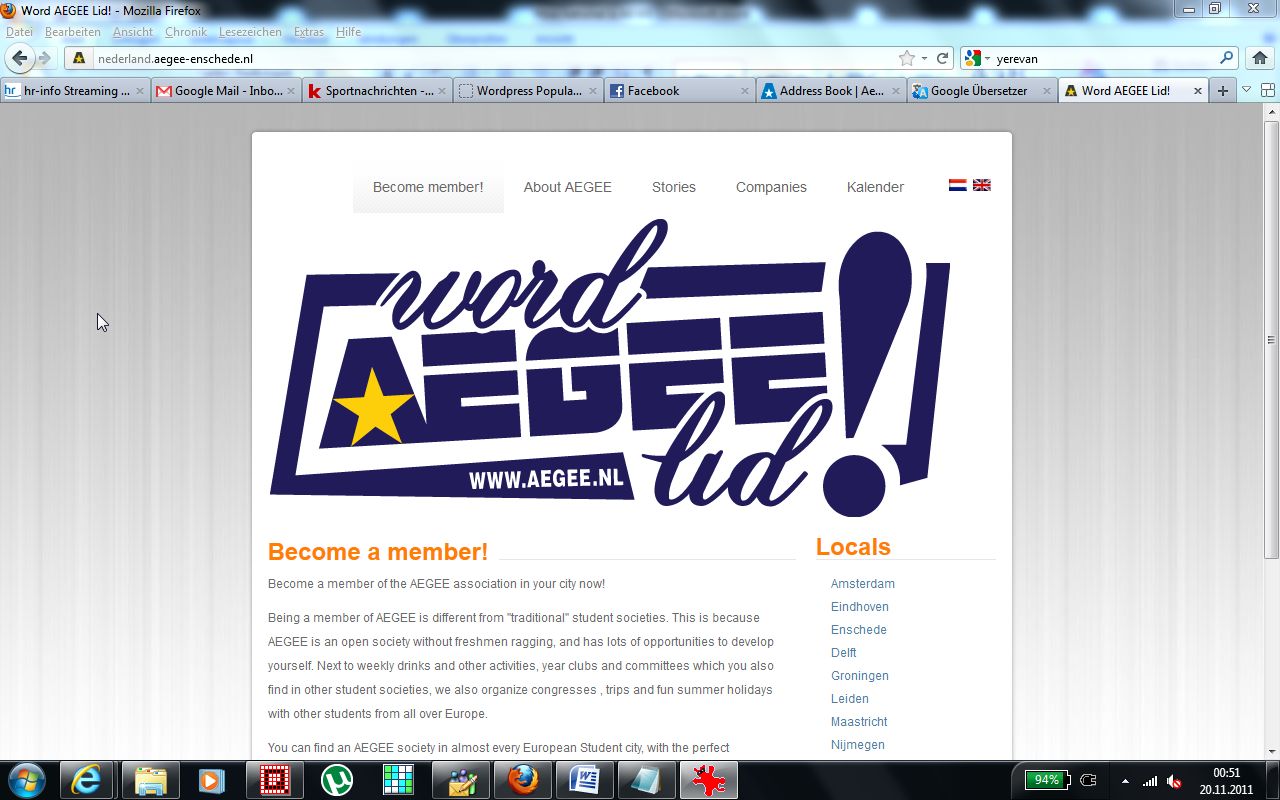
AEGEE.nl: Also the Dutch AEGEE locals have a common platform, in which they promote on the frontpage the benefits of becoming member of a Dutch antenna in English. The site AEGEE.nl is an alias of http://nederland.aegee-enschede.nl/. Among the benefits, however, is not mentioned that AEGEE is a European association without national borders or level.
AEGEE.pl: As mentioned earlier, there is also a national AEGEE site in Poland Next to the links to all national antennae (which you also find on the Hungarian, Dutch and Italian one) you find in Polish language in the main window the information that there is no national level and therefore no AEGEE-Polska. Also, you find there the contact data of AEGEE-Europe right in the centre of the page. So far, so good. However, under the link http://www.aegee.pl/aegee.php?show=anteny you find a map of Poland with little stars marking the location of Polish locals. Here AEGEE stops indeed at the borders, because cities like Berlin, Prague, Brno or Lviv, which you find in the corners of the map, don’t get a star.
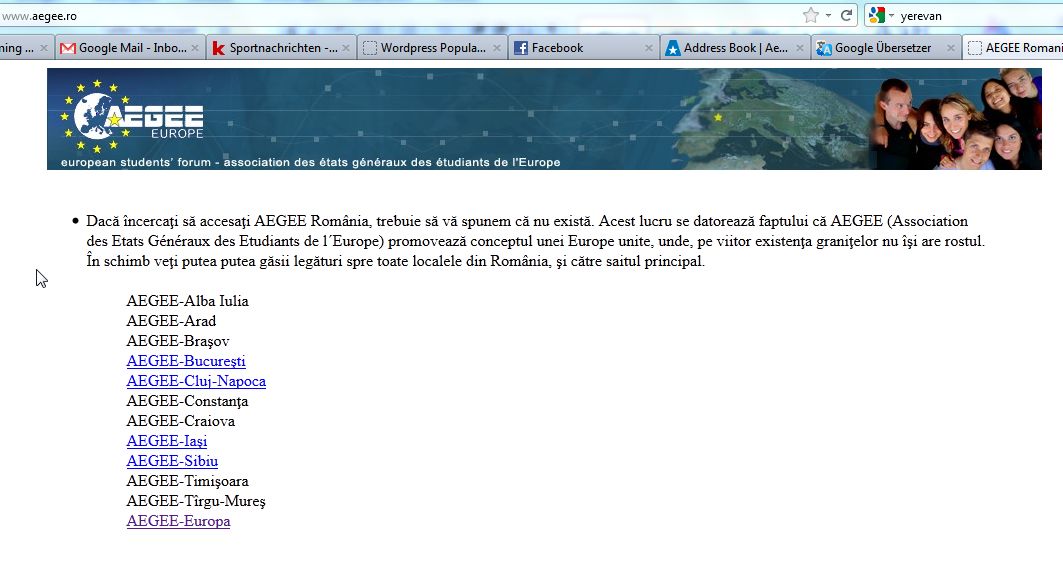
AEGEE.ro: Also the Romanian locals have a common platform, www.AEGEE.ro. On this simple landing page you find in Romanian language the same as on the Italian and Hungarian one:
If you try to access AEGEE-Romania, we must tell you that there is none. This is because AEGEE promotes the concept of a united Europe, the future existence of borders not serves any purpose. Instead you can find links to all locales in Romania, and the main site.
AEGEE.ru and AEGEE.es: AEGEE.ru is for sale! A company registered the site and tries to sell it. Let’s hope no one buys it. Also the Spanish site AEGEE.es was registered by someone and just used a link promotion site – without any AEGEE connection. In addition, there is also AEGEE.lu in Luxemburg. However, since the capital has the same name as the country and is the only university city, this is a special case.
Conclusion
So how national in AEGEE? In fact, not at all. The European idea is still so firm in the minds of the members, so there is no real threat. All sites have only the purpose of a better promotion of antennae in one country. Olga Yatsina, speaker of the Network Commission, says about the national sites: “We had a discussion about it in the NetCom some time ago and we decided that we are not against creating such websites under the condition that there is a remark at the main page like ‘AEGEE has no national level, therefore this web site has the main aim only to inform about AEGEE locals, events and possibilities on the territory of …’ Such websites can be really helpful for PR and HR strategies and of course for FR, when potential sponsor needs to see the scope of organisation in order to understand if it’s profitable to work with it.” This requires uniform standards, though, which don’t exist yet.
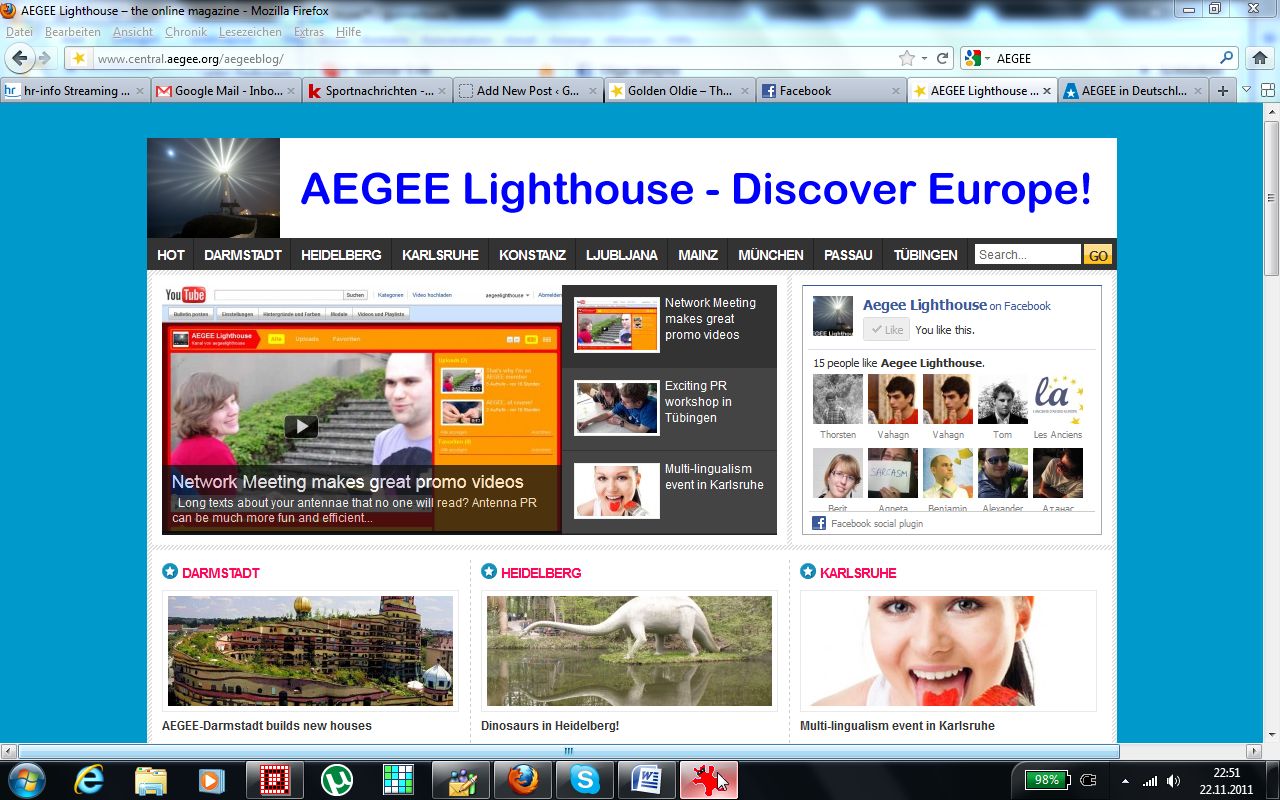
However, is this really the best solution? The old AEGEE.de page featured the sentence: “I case you are looking for the nearest AEGEE branch, check aegee.org”. Why not linking AEGEE.de to the AEGEE-Europe site? It would be a good solution if everyone, who types AEGEE.de gets automatically to an English-language sub-site of AEGEE.org, telling about the European website and featuring this drop-down box from this page: http://intranet.aegee.org/antenna/antennae_directory. This way, every visitor would see at once that this is a huge network with great places. And nothing national would be left.
An alternative to a national site would be regional sites. Not in the sense of the old ten regions of AEGEE’s past, but rather of smaller regions of nine antennae in the neighbourhood – under the brand name of AEGEE Lighthouse: http://www.central.aegee.org/aegeeblog. The Golden Oldie introduced this concept to the participants of the Network Meeting in Tübingen this spring. Nine antennae of a region could use this type of site to present their local and European activities. The nine antennae don’t even need to be from the same country. They could include for example AEGEE-Passau, AEGEE-Wien, AEGEE-Plzen, AEGEE-München, AEGEE-Bratislava and AEGEE-Praha – including places that can be reached without long distances, creating a truly European feeling.
Anyway, we can be sure the Network Commission will find a good solution very soon.
Until then: vote in the Golden Oldie poll on Facebook: “What constitutes for you a national level in AEGEE?” – http://www.facebook.com/questions/249595385096688/?qa_ref=qd
Related Posts
1st August 2019
The Gallery of All Presidents of AEGEE-Europe
Here is the gallery of all Presidents of AEGEE-Europe - with photos of every one of them. Enjoy the list!

